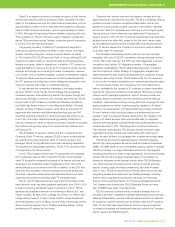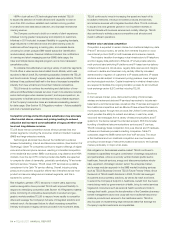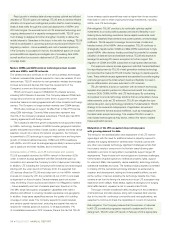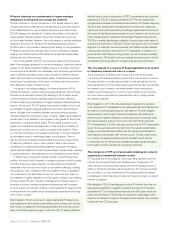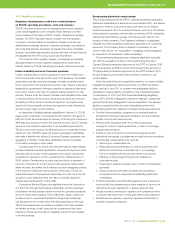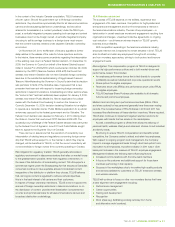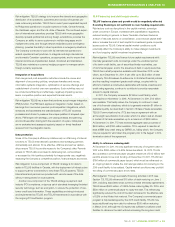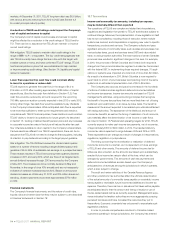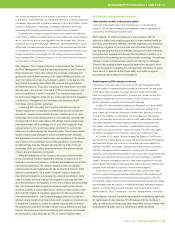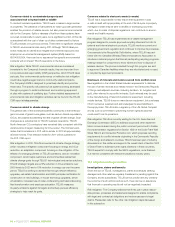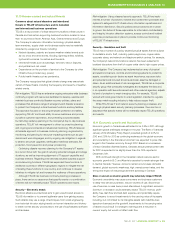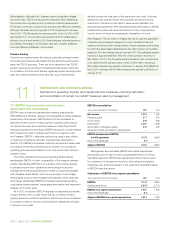Telus 2011 Annual Report Download - page 94
Download and view the complete annual report
Please find page 94 of the 2011 Telus annual report below. You can navigate through the pages in the report by either clicking on the pages listed below, or by using the keyword search tool below to find specific information within the annual report.90 . TELUS 2011 ANNUAL REPORT
Absent the enforcement of such safeguards, there is a potential risk
that
vertically integrated competitors, owning both broadcast content
and
broadcasting distribution assets, could unfairly raise programming costs
of non-vertically integrated companies such as TELUS, and/or attempt
to withhold content on new media platforms (Internet and mobile
platforms), or otherwise disadvantage TELUS in attracting and retaining
wireless or Optik TV customers. These regulatory safeguards improve
the bargaining position of non-vertically integrated companies, such as
TELUS, for new content. However, there can be no assurance that
the new regulatory safeguards will be fully effective. Various follow-up
consultations have been launched to implement the policy set out
in Regulatory framework relating to vertical integration. The CRTC has
sought comments on the proposed wording for amendments to the
relevant Regulations and exemption orders in Broadcasting Notice of
Consultation CRTC 2011-804, Broadcasting Notice of Consultation
CRTC 2011-805 and Broadcasting Notice of Consultation CRTC 2011-806.
A consultation process has also been initiated to consider a standard
form non-disclosure agreement to address concerns relating to the
sharing of information within a vertically integrated company (Broadcasting
Notice of Consultation CRTC 2011-791).
On December 12, 2011, the CRTC issued Broadcasting Decision
CRTC 2011-765. In the Decision, the CRTC found that Bell and Bell Mobility
(collectively, Bell) conferred an undue preference on itself by entering
into an agreement with the NHL and NFL giving Bell the exclusive right
to distribute major sports broadcasts to its mobile phones in Canada.
In its Decision, the CRTC directed Bell to file a report with the Commission
outlining the steps it will take to ensure that TELUS (the complainant
in the CRTC proceeding) has access to the programming at issue on
reasonable terms, and to provide a copy of the report to TELUS. On
January 10, 2012, Bell applied to the Federal Court of Appeal to review
the CRTC’s decision.
On March 22, 2010, the CRTC introduced a new framework to
allow over-the-air television broadcasters to enter into negotiations with
broadcasting distribution undertakings to establish a fair value for the
distribution of their local over-the-air television signals. The CRTC was
uncertain whether it had the authority to implement such a signal com-
pensation regime and referred the matter to the Federal Court of Appeal
seeking clarification of its jurisdiction under the Broadcasting Act. On
February 28, 2011, the Federal Court of Appeal, by majority, found that
the CRTC does in fact have the necessary authority to implement the
intended regime. Leave to appeal the decision of the Federal Court of
Appeal was granted by the Supreme Court of Canada on September 29,
2011. In the event that the value for signal regime proposed by the CRTC
is actually implemented, it could lead to an increase in the cost of offering
Optik TV that TELUS may not be entirely able to recover through price
increases due to competition in the broadcasting distribu tion market from
vertically integrated broadcasting conglomerates.
Billing practices for residential wholesale high-speed
access services
In Telecom Regulatory Policy CRTC 2011-703, the CRTC determined
the manner in which ILECs and incumbent cable-TV carriers can charge
their wholesale customers for bandwidth usage for residential wholesale
high-speed access services. The CRTC has indicated that ILECs and
incumbent cable-TV carriers can use either a flat-rated unlimited usage
access rate or a rate that combines an access rate and a usage charge
based on reserved network capacity. These determinations followed
the CRTC’s review initiated by Telecom Notice of Consultation 2011-77.
It is not expected that these determinations will be material to TELUS.
Provincial consumer protection legislation
Several provinces have either passed or proposed legislation to provide
consumers of wireless services with more detailed information and greater
flexibility upon the expiry of a contract. Some legislation also applies to
wireline services. There is a potential for different jurisdictions to impose
different conditions on service providers which could result in higher
operating costs for TELUS.
Radiocommunication licences regulated by Industry Canada
All wireless communications depend on the use of radio transmissions
and, therefore, require access to radio spectrum. Under the Radio-
communication Act, Industry Canada regulates, manages and controls
the allocation of spectrum in Canada, and licenses frequency bands
and/or radio channels within various frequency bands to service providers
and private users. Voice and data wireless communications via cellular,
specialized mobile radio (SMR), enhanced specialized mobile radio
and personal communications services (PCS) systems, among others,
require such licences. TELUS’ PCS and cellular licences include
various terms and conditions, such as:
.Meeting Canadian ownership requirements
.Meeting obligations regarding coverage
.Spending at least 2% of certain PCS and cellular revenues
on research and development
.Annual reporting
.Mandated roaming and antenna site sharing to competitors.
While TELUS believes that it is substantially in compliance with its licence
conditions, there can be no assurance that it will be found to comply
with all licence conditions, or if found not to be compliant that a waiver
will be granted, or that the costs to be incurred to achieve compliance
will not be significant. Initial licence fees and annual renewal fees are
payable for licences that have not been obtained via spectrum auction.
Foreign ownership restrictions
TELUS and its subsidiaries are subject to the foreign ownership restric-
tions imposed by the Telecommunications Act, the Radiocommunication
Act and the Broadcasting Act and associated regulations. Although
TELUS believes that TELUS Corporation and its subsidiaries are in com-
pliance with the relevant legislation, there can be no assurance that a
future CRTC, Industry Canada or Heritage Canada determination, or
events beyond TELUS’ control, will not result in TELUS ceasing to comply
with the relevant legislation. If such a development were to occur, the
ability of TELUS’ subsidiaries to operate as Canadian carriers under the
Telecommunications Act or to maintain, renew or secure licences under
the Radiocommunication Act and Broadcasting Act could be jeopardized
and TELUS’ business could be materially adversely affected.
In June 2008, the Competition Policy Review Panel provided its
final report to the Minister of Industry. The Panel made a number of
recommendations to liberalize foreign ownership rules for the telecom-
munications and broadcasting sectors. Subsequently, the federal
government Throne Speech on March 3, 2010 and the federal budget
on March 4, 2010 signalled an intention to consider opening the telecom-
munications services sector to further foreign investment. In June 2010,
Industry Canada unveiled three options for consultation on lifting foreign
ownership restrictions for telecommunications companies:
1. Increase the limit for direct foreign investment in broadcasting
and telecommunications common carriers to 49%
2. Lift restrictions on telecommunications common carriers with
a 10% market share or less, by revenue
3. Remove foreign ownership restrictions completely.



